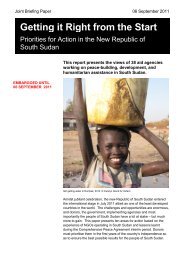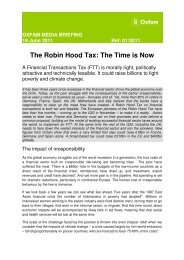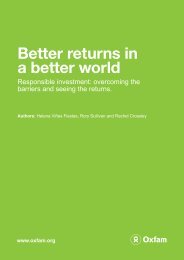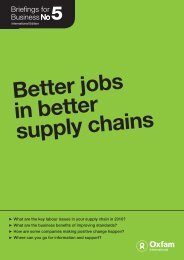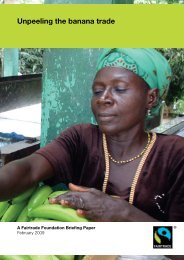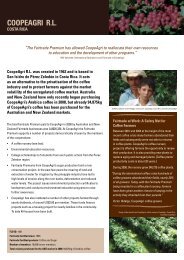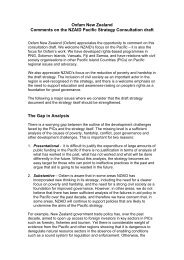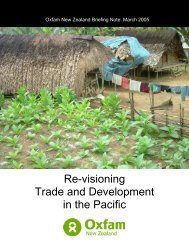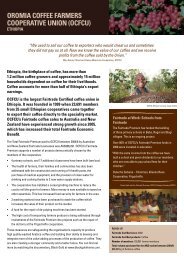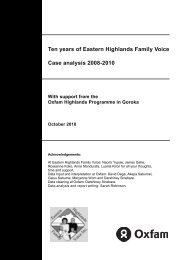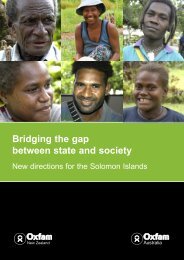Growing a Better Future - Oxfam International
Growing a Better Future - Oxfam International
Growing a Better Future - Oxfam International
- No tags were found...
Create successful ePaper yourself
Turn your PDF publications into a flip-book with our unique Google optimized e-Paper software.
3.2A newgovernancefor foodcrisesAs we lurch uncertainly into the age of crisis, facing oursecond global food price spike in three years, more mustbe done to build resilience and manage the climatic andeconomic risks looming on the horizon.<strong>International</strong> reformAs the global food system becomes increasingly volatileand unstable, the risk of a slide into a zero-sum world ofresource nationalism – a contest that women and menliving in poverty would be guaranteed to lose – becomesmore real. Alternatively, the world could move decisivelytowards a more just, resilient, and sustainableglobalization – but only if it tips decisively towardsinternational co-operation rather than competition.Today’s international system – fragmented, ad hoc, lowon legitimacy, and high on gaps and friction betweengovernments and institutions – is not yet up to the task ofco-ordinating and delivering this outcome. Reform canbegin today, with a number of immediate measures toreduce risks, improve co-ordination, and build trust,setting into motion a process of evolution towards a newsystem of governance that can both mitigate against andmanage the shocks coming down the line.During the 2008 food price crisis, co-operation wasnowhere to be seen. Governments were unable toagree on the causes of the price rises, let alone how torespond. Food reserves had been allowed to collapse tohistoric lows. Existing international institutions andforums were rendered impotent as more than 30countries imposed export bans in a negative-sum gameof beggar-thy-neighbour policy making. 124Now with food prices back at a new all-time high, a rangeof urgent actions is needed.1. Manage trade to manage riskBuild a system of multilateral food reservesOne of the reasons that food prices hit such highs in2008 is that markets were trading so thinly: becausereserves were at all-time lows, changes in supply anddemand were borne entirely by the price mechanism.Panic buying by governments on international markets,as import-dependent countries seek to build up nationalstocks, could all too easily worsen the very volatility thatit is trying to defend against. Instead of acting unilaterally,governments should work collectively to establishregional food reserves and strategic cross-border tradingsystems with each other – an approach that createsresilience against volatility while reducing the risk ofgovernments competing against each other.Increase market transparencyThe tendency of governments to panic buy and horde isin large part a consequence of poor market information:market participants have very little reliable informationon the levels of stocks held by governments or privatesector traders. Mandating the FAO, for example, tocollect and disseminate aggregated data on stocks,reserves and anticipated supply and demand would helpmarkets to function better.Co-ordinate to tackle export restrictionsCurrent global rules on food export restrictions are atbest modest. Prima facie, such restrictions are bannedunder the GATT and the WTO Agreement on Agriculture,but in practice vaguely worded and untested exemptionclauses allow countries to impose them whenever theylike. Revising international trade rules will take time,however, and given the recent resurgence in the use ofexport restrictions – for example, Russia’s ban on wheatexports in summer 2010 – urgent action is needed. Majorfood exporters ought to publicly commit to refrain fromimposing sudden export restrictions, and also commit toexempting humanitarian aid from any such restrictions.This option is already on the agenda for France’s G8 andG20 chairmanship in 2011, and should be a top priorityfor member states.46Overleaf left: Osvaldo Penaranda, 48, with his tomato plants onthe elevated seedbeds (camellones). Flooding is increasinglyunpredictable in this area of the Amazon Basin. (Bolivia, 2007)Overleaf right: Noograi Snagsri now spends less time working in herfields thanks to the new integrated farming system where water ispiped directly into the fields. In 2007 farmers in Yasothorn Province,north-east Thailand, experienced the longest dry spell in decades.(Thailand, 2010)



